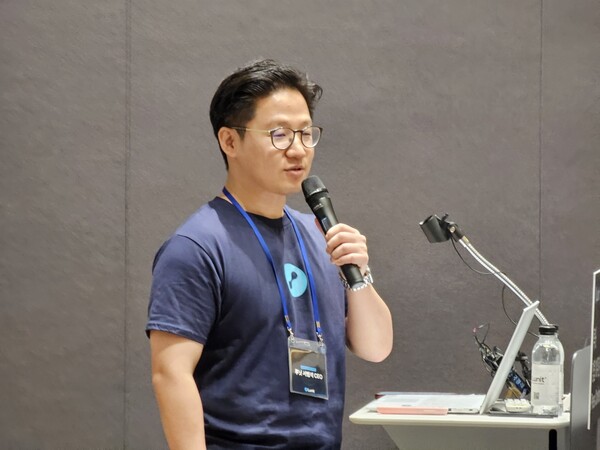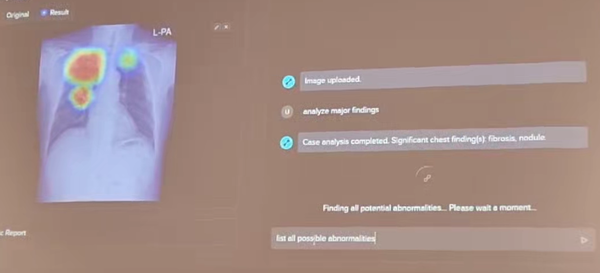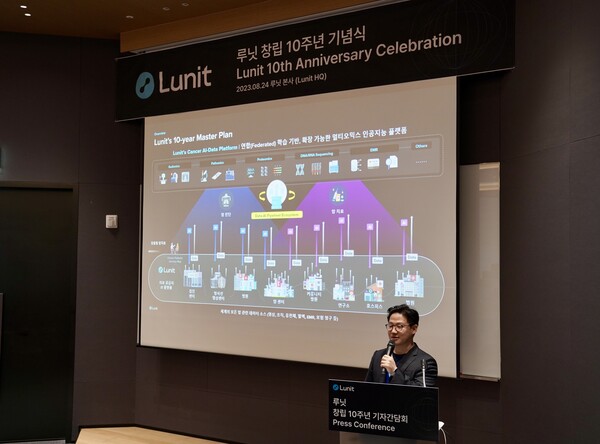Lunit has unveiled its ambitions to transition from an AI-backed medical imaging company to a big data healthcare platform provider and become profitable by 2025 through such businesses.
The company held its 10th-anniversary press conference at its headquarters in Gangnam-gu, Seoul, on Thursday, where its CEO Suh Beom-seok announced its Vision 2030 business plan for mid-to long-term growth roadmap.

Launch of medical big data platform business
According to Suh, Lunit is newly entering the AI platform development business that integrates and manages medical big data based on AI.
"We want to build a single platform that connects and learns from individual hospital's data," Suh said. "To this end, we will collect various cancer-related data from screening centers, regional hospitals, clinical trial institutes, and cancer centers worldwide and analyze them with advanced AI learning models."
Lunit will then develop an autonomous AI platform that manages medical data by installing it directly into the medical institution's system, Suh added.
The AI platform will significantly improve the accuracy of cancer diagnosis and treatment prediction, making it possible to detect cancer early and provide customized treatment for individual patients, he said.

Suh demonstrated the autonomous AI platform at the news conference.
"When we analyzed cancer-related data with our AI platform, which is still in development, it provided more accurate results than the AI developed by Google," Suh said.
Suh explained that Lunit's autonomous AI platform works similarly to that of ChatGPT.
"If you put up an X-ray image and ask it to analyze it like ChatGPT, the AI will analyze it by itself and come up with a solution," he said.
In fact, when Suh input an image and asked the AI to analyze it, it found tumors and nodules in a matter of seconds.
He then asked the AI to create an email to explain the findings to the patient, and it created a very informative and personal email.
"We believe that in the future, AI platform's reading accuracy will be close to 100 percent, which means that an era where autonomous AI can read images independently is not far away," he said.
Lunit is also promoting the development of a whole-body MRI that can detect all cancers in the body through medical imaging.
"Whole-body MRI has a high detection rate and low false positive rate compared to existing imaging diagnosis methods, and there is no risk of radiation exposure, so it has enough potential to become the next solution for cancer screening," Suh said.
When asked whether the development of whole-body MRI is a move into the medical device industry or related software development, Suh said it has not yet been decided.
Suh also expressed his views regarding a question about medical organizations, such as the American Academy of Family Physicians and the American College of Radiology, not recommending whole-body MRI because it has not been proven to be cost-effective or effective in prolonging life.
"It's true that there is no evidence that whole-body MRI is necessary right now," he said. "However, we are still interested in whole-body MRI because there's a market for it in the U.S., especially in the high-end health screening market."
Still, Suh acknowledged that to use whole-body MRI as the standard care, large-scale studies are needed to establish related evidence.
"It will be important to catch false positives in these studies, and this is where I think AI can make a big contribution," he said. "Another important aspect is cost-effectiveness, and while we currently diagnose each cancer type separately, our platform can screen for 20 cancers at once, which will be very compelling cost-wise."

Lunit plans to further expand the use of its AI biomarker platform
While the company has focused on developing biomarkers for immunotherapies, it plans to expand its scope to antibody-drug conjugates (ADCs) as well.
By developing multiomics biomarkers, Lunit hopes to contribute to the optimal selection of cancer treatments for cancer patients.
"The integrated learning of pathology and medical images with analytical technology is expected to have a higher predictive effect on anticancer drug treatment," Suh said. "Lunit is also engaged in drug discovery and will apply Lunit SCOPE to promising drug development candidates, and if positive results are obtained, Lunit will pursue licensing in the candidates."
Lunit will then refine its business model by either developing and commercializing the drug itself or exporting the technology to a large pharmaceutical company, Suh added.
In the near future, Suh said that the company's existing diagnostic business revenue is still growing and expects to turn profitable by 2025.
"We are focusing on various businesses to achieve our goal of 10 trillion won ($7.5 billion) in sales and 5 trillion won in operating profit by 2030," he said.
Lunit posted 13.8 billion won in sales and 5 billion won operating loss in 2022.
Listed on Kosdaq, Lunit shares traded at 155,000 won as of 2:41 p.m. on Thursday, up 6.55 percent from the previous day.
Related articles
- Lunit to disclose AI-powered tertiary lymphoid structure analysis at World Conference on Lung Cancer
- Lunit strikes another deal in Middle East with region’s largest healthcare provider
- Lunit to supply AI chest screening solution to National Police Hospital
- Lunit raises ₩200 billion in capital increase to strengthen R&D
- Lunit to launch Guardant Health’s cancer diagnosis service in Korea
- Lunit AI finds its place in European breast cancer screening system
- Lunit, UK hospital to launch prospective AI study in symptomatic breast clinic setting
- Generative AI's infiltration of healthcare: insights from industry experts

